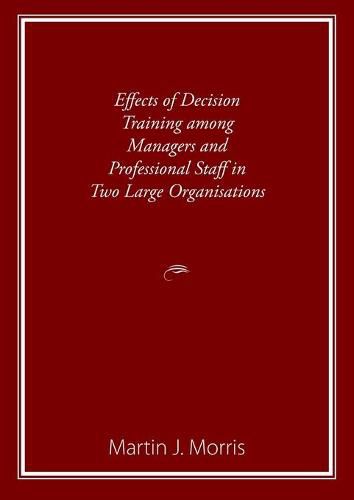Effects of Decision Training among Managers and Professional Staff in Two Large Organisations
Martin Morris

Effects of Decision Training among Managers and Professional Staff in Two Large Organisations
Martin Morris
This title is printed to order. This book may have been self-published. If so, we cannot guarantee the quality of the content. In the main most books will have gone through the editing process however some may not. We therefore suggest that you be aware of this before ordering this book. If in doubt check either the author or publisher’s details as we are unable to accept any returns unless they are faulty. Please contact us if you have any questions.
The efficacy of aids to individual decision making has received little or no attention in published psychological literature. A number of untested assertions have been made in recent years concerning the usefulness of training in decomposition techniques as an aid to decision makers. This study examined the effects of such training on groups of managers and senior professional staff in two large organisations.
It was expected that subjects trained in a systematic procedure for decomposing decisions would report a more structured approach to information processing in their decision making. Discriminant analysis of six principal factors identified from responses to a Decision Making Questionnaire failed to identify significant differences between trained and untrained subjects. Trained subjects expressed more dissatisfaction with lack of goal clarity in organisational settings. The principal benefit of training was reported as an aid to communication in decision making groups. It was expected that differences would be found between organisations; as one organisation had institutionalized such training programs over some years. No significant
differences were found between organisations on any of the six factors. 27 trained subjects of both sexes were matched with 27 untrained subjects. Additional data was collected from interviews with each subject. It was concluded that, at their present stage of development, normative theories of decision behaviour do not account for a sufficiently large proportion of variance to be useful as aids to individual judgment and decision making. It was
conjectured that social learning theory provides a more useful model of decision behaviour in organisations.
This item is not currently in-stock. It can be ordered online and is expected to ship in 7-14 days
Our stock data is updated periodically, and availability may change throughout the day for in-demand items. Please call the relevant shop for the most current stock information. Prices are subject to change without notice.
Sign in or become a Readings Member to add this title to a wishlist.


